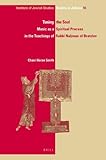Tuning the soul : music as a spiritual process in the teachings of Rabbi Naḥman of Bratzlav / [Chani Haran Smith].
Material type: TextSeries: IJS studies in Judaica ; v. 10.Publication details: Leiden ; Boston : Brill, 2010.Description: 1 online resource (ix, 231 pages) : illustrationsContent type:
TextSeries: IJS studies in Judaica ; v. 10.Publication details: Leiden ; Boston : Brill, 2010.Description: 1 online resource (ix, 231 pages) : illustrationsContent type: - 9789004189607
- 9004189602
- 1283039176
- 9781283039178
- Naḥman, of Bratslav, 1772-1811 -- Views on music
- Naḥman, of Bratslav, 1772-1811 -- Teachings
- Naḥman, of Bratslav, 1772-1811
- Music -- Religious aspects -- Judaism
- Spiritual life -- Judaism
- Musique -- Aspect religieux -- Judaïsme
- Vie spirituelle -- Judaïsme
- RELIGION -- Judaism -- General
- Music
- Music -- Religious aspects -- Judaism
- Spiritual life -- Judaism
- Teachings
- 296.8/332092 22
- BM755.N25 S56 2010eb
- online - EBSCO
| Item type | Current library | Call number | URL | Status | Notes | Barcode | |
|---|---|---|---|---|---|---|---|
 eBook
eBook
|
Biblioteca "Angelicum" Pont. Univ. S.Tommaso d'Aquino Nuvola online | online - EBSCO (Browse shelf(Opens below)) | Online access | Not for loan (Accesso limitato) | Accesso per gli utenti autorizzati / Access for authorized users | (ebsco)360423 |
Includes bibliographical references (pages 201-214) and index.
Preface; Note on Translation of Sources and Transliteration; Introduction; Chapter One The Doctrine of the 'Good Points' and Its Kabbalistic Sources; Chapter Two Music as a Spiritual Process; Chapter Three The Dual Personality of the Tzadiq: Moses and Joseph; Chapter Four New Time, New Song; Glossary; The Ten Sefirot; Bibliography; Index.
Print version record.
This book is an in-depth study of the function of music in religious experience according to Rabbi Na?man of Bratzlav. It provides new insights on his unique doctrine of the Good Points, which represent the core of loving kindness and holiness in the human soul, and the musical context in which they become both a means and a metaphor for spiritual transformation. Drawing on midrashic and kabbalistic sources, the book explores Na?mans perception of different types of tzadiqim (religious leaders), including himself, and the special role music plays in their leadership. It highlights the importan.


